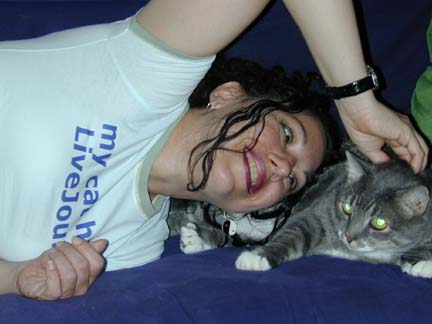Free and Easy
Or
Bright Eyes is worth every cent I paid for it
So, I have this friend whom I like alot, even though he’s kinda evangelical about things in a way that borders on annoying. He’s always like “buy this!” “read this! I know you’ll like it!” and it’s more often than not it’s something really inappropriate like the novelization of Garfield the Movie. And lately he’s been sending me links for free downloads, and yeah, it’s free, but The Hives? The Strokes? The Worst of Interpol?
You all have the same friend. It’s Amazon*. And I’m probably a little late to the party about this, but Amazon offers an assload of free music downloads. Obviously it’s to get people to buy things, but I’ve been loading up my i-pod with things I’ll never ever buy, like The Arcade Fire, Bright Eyes, and, yes, Elliott Smith. And I put it in it’s own Amazon playlist (this month’s is imaginatively called Amazon 1005) and listen to it at the gym, and I’m always like “What? Is this what the kids like? The kids is stoopit.” So, Amazon, it’s not working! And yet, I cannot stay away. Every few weeks I go trolling for free downloads.
Now, here’s the even weirder thing: people are making those Amazon “Listmania” an “so you’d like to” lists for the free downloads! They’re free! why do you need recommendations? That’s like if I needed some kid in Tampa to write me a list of what chocolates to take on a table of free chocolates. I’m tasting each one! And if I don’t like it I’m spitting it into the garbage! But now I find myself clicking on downloads on the recommendations lists that maybe I wouldn’t have normally. Like if said kid from Tampa doesn’t recommend Interpol and The Strokes, maybe I take his recommendation of Assmen a little more seriously. And now I can honestly say things like “VHS or Beta? They totally suck!” instead of saying that dishonestly because maybe I saw them on New York Noise and they sounded like a bad disco wedding band, but maybe I was confusing them with Ladytron. Now I know. And that’s dangerous. Before I might have kept my mouth shut, and now there is no stopping my constant spewing of hatred of hipster bands! Get out the way! It’s like I’m the fat may in the restaurant and Amazon just gave me a wafer thin mint. Also, I’m not the only gay in the village. OK, that makes no sense in this context, but I just wanted to make a reference to Little Britain.
Now, in case I’m called upon to plug my i-pod into a PA system at a Todd P show, my amazon playlist will be guaranteed to please the urban outfitters in attendence. And I will laugh while you groove to Ladytron because I got it for free, and you could have too and didn’t.
* Here is my secret confession--I came upon the Amazon free downloads when looking for a peppy little goth disco song from the late 90s--Annie Would I Lie to You, by Iris. Go look for it! It's free!

